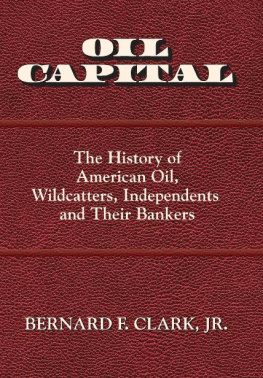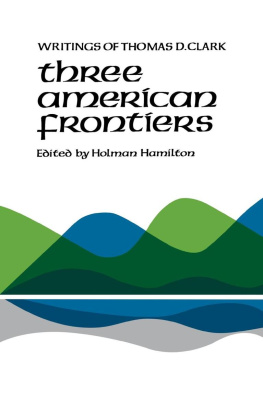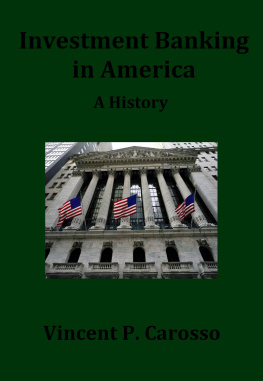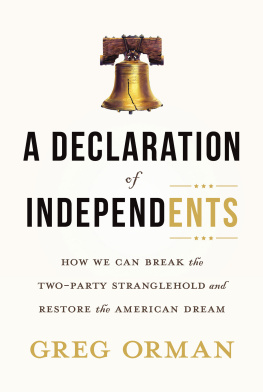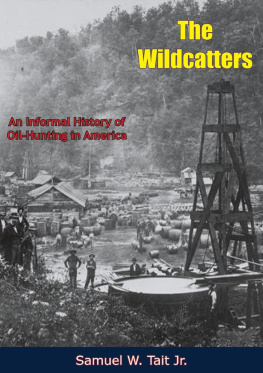OIL CAPITAL
The History of American Oil, Wildcatters, Independents and Their Bankers
BERNARD F. CLARK, JR.
Library of Congress Control Number: 2016903602
Copyright 2016 Bernard F. Clark, Jr.
All rights reserved.
ISBN: 978-0-692-70943-6
ISBN: 978-0-692-81193-1 (e-book)
This book is dedicated to my father, Bernard F. Clark, who spent his career wrestling with the independent producers constant demand for capital as Executive Vice President and Chief Financial Officer of Mitchell Energy & Development Corp. from 1956 until 2001.
Style is adapted, primarily from The Associated Press Stylebook and Briefing on Media Law and The Chicago Manual of Style.
CONTENTS
INTRODUCTION
The oil and gas business is always out of money. It just inhales capital.
Joe Bridges
T he history of oilmen and the energy bankers who loan them capital is inextricably bound together. Energy bankers have reacted, adjusted and evolved alongside the same business cycles, regulatory changes and commodity-price gyrations that have challenged the generations of oilmen they banked. In many respects, however, it is remarkable how little has changed during the past 100 years in the fundamentals of lending against collateral that has been hidden underground for millions of years. Nor has there been much change in the relationship between the early wildcatters willing to risk theirand their bankerslast dime and the bankers who cautiously evaluate the oilmen and their collateral.
While the fundamentals have remained unchanged, bankers analyses, tools and documentation of oil and gas lending have evolved in step with wildcatters tools for finding, drilling and producing the very oil and gas that serve as the bankers collateral and wildcatters salvation.
The early connection between banks and independent explorersknown as wildcattersis, perhaps, closer than is commonly known. In the oil industry, wildcat refers to a well drilled in an area with little or no production. A wildcatter is the optimistic, daring or just plain desperate enough individual who drills these wells. But historical references suggest the earliest use of the term wildcat was to describe less-reputable banks that, before 1863, were set up in out-of-the-way locationsthought of as haunts of wildcatsto restrict the number of holders who could, only by presenting them in person, redeem these banks notes.
A Detroit company wrote to one of its customers in 1838, according to a letter published by a Vermont newspaper, We have had nearly sixty new Banks start into operation within about the last three months. They are called the Wild Cat Banks the notes they issue are called Wild Cat Money our state is full of it; if you take Five dollars to-day, perhaps to-morrow, four of the five may be good for nothing a dollar in specie is almost as rare as a swallow in midwinter.
More than 40 years later, wildcat was used to describe oil and gas prospectors. When an operator goes into an undeveloped field, and puts down a test well, he naturally desires to have the profit of his risk, New Yorks The Sun reported in 1883. It costs him something like $6,000 to put down that wildcat well, for which in most cases, he gets no return, for the majority of wildcat wells produce nothing.
The oft-colorful history of oil and gas exploration and production has been widely documented in books, articles and films in which wildcatters and oilmen have been either lionized or criticized but always super-sized. The less romanticized history is not as well known. But, for those involved in the industry, many lessons can be learnedand relearnedfrom a review of the historical relationships of wildcatters and bankers and the evolution of the loan documentation that has bound these parties.
Very few oilmen started with sufficient wealth to personally finance their operations. Along with manpower, rigs and drill pipe, capital has always been a critical tool in the exploration for and development of oil and gas. From the earliest days of the industry, producers have required more start-up capital for acquisition, drilling and development of oil fields than can be generated out of cash flow from existing production. The accomplishments of oil companies were and are as dependent upon access to capital as access to the hydrocarbons they seek to exploit.
An independent oilman, Joe Bridges grew up in West Texas Permian Basin. A University of Texas engineering graduate, Bridges has worked in oil and gas fields as an energy banker at First City in Houston, as a chief financial officer for a public oil and gas company and as the founder of his own oil and gas companies. He said in a 2012 interview of the role that access to capital has played and continues to play in the American industry, The oil and gas business is always out of money. It just inhales capital.
This book tells the story of this enduring relationship in the context of the evolution of the two industries. Because changes in lending against oil and gas property have closely followed the milestones of the oil and gas industry, this evolution is best discussed chronologically in the context of U.S. and global events in the industry.
Michael Quinion, Wild Strike, World Wide Words, Investigating the English Language Across the Globe , accessed October 18, 2014, (quoting the Rutland Herald , March 20, 1838).
Rutland Herald , March 20, 1838, quoted in Quinion, Wild Strike.
Quinion, Wild Strike.
Joe Bridges (President, Bridges Family Petroleum, Inc.), interview by the author, October 2, 2012.
CHAPTER 1
Private OwnershipThe Foundation of the U.S. Oil and Gas Industry
Whosoever the soil belongs, he owns also the sky and to the depths.
Accursius
T o fully appreciate the relationship between the oil and gas industry and its bankers, one must step back and better understand the American history of oil and gas and its legal foundations. It is a history that dates back to the 16th century. Compared with almost every other oil-producing country in the world, ownership of oil and gas in the U.S. by private parties, often landowners, is an anomaly. And, it is no coincidence that nowhere else is oil and gas technology and infrastructure better developed than in the U.S.
The synergy of a capitalist economy and the private ownership of minerals propelled the U.S. to become the worlds leader in exploration and exploitation of oil and gas and ushered in the Hydrocarbon Age: the birth of combustion engines that transformed the ground-and marine-transportation industry, made air travel possible, increased industrial productivity and continues to make goods and services increasingly affordable. The Allied cause had floated to victory upon a wave of oil, Britains Lord Earl Curzon declared, days after the end of World War I. Two decades later, the U.S. provided the fuel again that, literally, resulted in the Allied Powers victory in World War II.
Much of the oil supporting the Allies efforts during the First World War came from newly discovered oil fields in U.S. boomtowns on the Gulf Coast and in Texas, Oklahoma and California. After the war, oil and gas companies continued to improve their operations and tools, explored offshore California and in the Gulf of Mexico, and went abroad to discover and develop oil resources in Southeast Asia, the Middle East, West Africa and South America.
U.S. universities and colleges taught not only Americans to become petroleum engineers and geologists; they also educated citizens of foreign countries who, with American know-how and technology, developed their countries reserves. Yet, after decades of exploration and development abroad, no country enjoys the U.S. level of development, infrastructure, technology and innovation. And, certainly, no country can claim as many successful, independent oil and gas companies.

